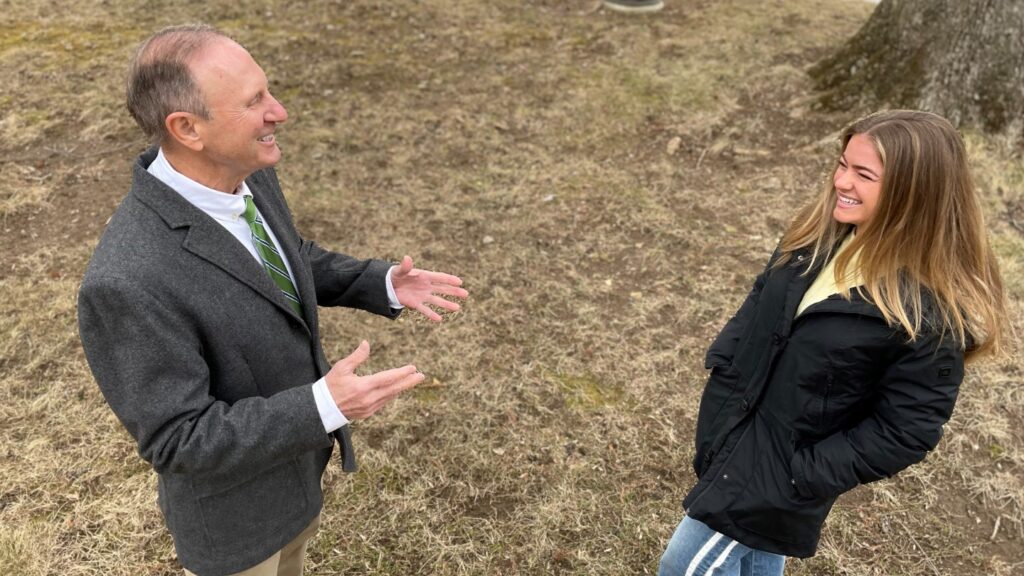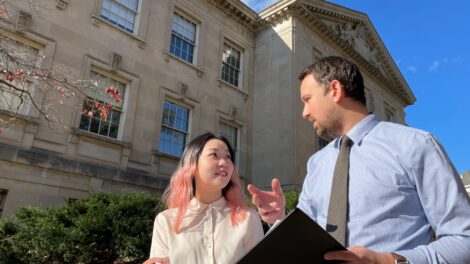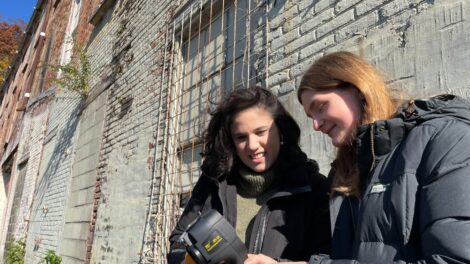Student research aims to reduce campus greenhouse gas emissions
By Bryan Hay
In what may be a first of its kind collegiate study, Gabriella Cinquini ’22 is documenting carbon emissions generated through Lafayette’s supply chain network and contributing data in support of the College’s Climate Action Plan.
Determined to pair her concern for the environment with a senior honors thesis, she reached out to Prof. Mark Crain last fall to brainstorm some ideas, and together they settled on a project to document sources of Scope 3 emissions from Lafayette’s various capital projects.

Gabriella Cinquini ’22 and Mark Crain, William E. Simon Professor of Political Economy and chair of policy studies
As defined by the U.S. Environmental Protection Agency, Scope 3 emissions are the largest contributors to an organization’s carbon footprint, resulting from activities, such as the production of construction materials, not owned or controlled by the reporting organization.
“Being from southern California and seeing firsthand the impacts of climate change, I found my path of study through my care for the environment and desire to contribute to climate mitigation tactics,” says Cinquini, a double major in policy studies and environmental studies.
I’m working on a personal level with a professor on a very personalized, meticulous research project. That’s one of the most standout qualities of Lafayette, where you can pursue a project that matters to you and make it your own.
She and Crain, William E. Simon Professor of Political Economy and chair of policy studies, came to the conclusion that it would be appropriate to focus on Scope 3 emissions at Lafayette, which has several major capital projects underway, and contribute to the success of the Climate Action Plan, whose goal is to reach carbon neutrality at Lafayette by 2035.
“My thesis is now all encompassing,” she says. “We’re in the process of gathering supply chain emission data related to the various construction projects on campus.”
Cement production, critical to any major construction project, is in itself one of the largest contributors of greenhouse gas emissions in the world, Cinquini says.
“And with all these new construction projects, we have to buy cement, and we have to import it,” she says. “This process in itself is a massive contributor to the College’s cumulative emissions.”
Emissions generated through construction alone will likely be much larger than the College’s Scope 1 and Scope 2 (direct and indirect greenhouse emissions, respectively) emissions combined, which are the College’s direct emissions already being tracked, Cinquini notes.
“Tracking and disclosing the Scope 3 emissions of an institution or business ultimately challenges what it truly means to be carbon neutral. What my thesis is aiming to do is follow the protocols issued by the EPA, and track and collect data surrounding multiple categories of Scope 3 emissions.”
Painstakingly detailed, Cinquini’s work has involved such areas as identifying quantities of cement and steel purchased for each construction project, where it’s manufactured, and the types of trucks that transport it.
Crain says her research is cutting edge and could have implications for how Lafayette and its contractors source building materials, such as cement, in the future.
“Gabriella has tapped into the frontiers of how organizations track their GHG emissions. Identifying and reporting Scope 3 emissions is voluntary today, but mandatory rules at the state and federal levels are coming soon,” he says.
Uniquely Lafayette
Cinquini has a lot of friends from California who ended up attending some of the huge universities in the state.
“All of them are just dumbfounded when I say that I’m working on a personal level with a professor on a very personalized, meticulous research project,” she says. “That’s one of the most standout qualities of Lafayette, where you can pursue a project that matters to you and make it your own. Here you can personalize your course of study.”
As her project has unfolded, Cinquini has followed her dad’s advice—to do the right thing at the right time. She’s now ahead of the curve, following an opportunity to navigate a specific yet rising subject matter that one day soon will change the course of how an institution’s supply chain emissions are managed.
“I’d like to think that my honors thesis research into measuring and reporting Scope 3 emissions will be a competitive advantage as I enter the professional space. I’m gaining knowledge and skills to solve a problem that others may not fully understand yet,” she says. “I am becoming an expert in something: conducting my own research and organizing my own data for something that matters and will make a difference here at Lafayette.”


1 Comment
I am soooo impressed….Grams
Comments are closed.